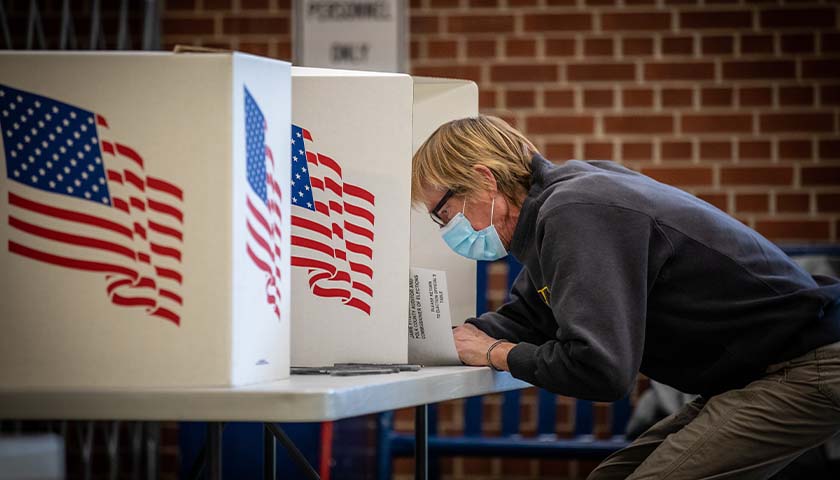by Michael McKenna
There has been a lot of talk during this election cycle about “voter enthusiasm;” which side has it, what are its causes, and what might it all mean for the final result. Much of it is propaganda that should be ignored, but there are some numbers and data that can help illuminate the terrain. All that attention is appropriate, given that each and every election depends entirely on who shows up to vote.
Let’s start with the propaganda.
Lots of attention has been focused on the Morning Consult’s time series on voter enthusiasm, which, at the moment, gives the Republicans a slight edge in voter enthusiasm, with 65% of the self-identified Republicans indicating that they are very excited about voting this year. The Democrats are trailing a bit, with only 62% of their folks saying that are excited about voting.
 If you don’t like those results, wait a minute or two. Morning Consult has been asking about voter enthusiasm for about 18 months now, and the answer has bounced around quite a bit. Way back in October 2021, the Democrats had a five-point advantage (53-48). At the end of July 2022, the Republicans had a nine-point advantage (61-52).
If you don’t like those results, wait a minute or two. Morning Consult has been asking about voter enthusiasm for about 18 months now, and the answer has bounced around quite a bit. Way back in October 2021, the Democrats had a five-point advantage (53-48). At the end of July 2022, the Republicans had a nine-point advantage (61-52).
It is probably important to note that the Morning Consult is a survey of registered voters, which means that it is an imprecise tool, and, at this point in the cycle, should probably be dismissed. Unfortunately, it is the only publicly-available survey that has responses on point with respect to enthusiasm over a relatively long period of time.
There has also been a lot of talk about new registrations, especially among women, in the wake of the Dobbs v. Jackson decision. For example, much was made last month about the surge of women registering in Pennsylvania — a ratio of four to one (women to men), and 63,000 new registrations so far in the cycle!
Is that a lot? It seems like a lot and it was certainly made to sound material. For purposes of context, however, in 2020 there were 250,000 new registrations in the Commonwealth of Pennsylvania at this point in the cycle. A little more context: there are 8.8 million registered voters in Pennsylvania. So maybe everyone should temper the enthusiasm about 48,000 new female registrants (or about one-half of one percent of all registered voters).
NBC News had to jump in the pool as well, with their assessment a two weeks ago that a fraction of persuadable voters might be thinking about possibly voting for Democrats this cycle. How did they come up with that?
Well, it turns out that NBC News derived “persuadables” by merging results from a handful of surveys, segregating pretty much anyone who wasn’t locked in and then took a look at how they were thinking about voting. If that methodology sounds sketchy, it is because it is. Worse yet for NBC’s headline writers, in the first three tries at merging surveys, “persuadable” voters leaned towards the Republicans.
Let’s move on from the propaganda and focus on good and useful metrics we can use to judge turnout in this cycle.
Through the magic of primaries, we can see how voters have actually already voted in this cycle, keeping in mind that contested primaries usually have higher turnouts. How do those numbers look and what can that tell us about voter enthusiasm?
In Wisconsin, 502,000 voted in the Democratic primary for Senate, which was hotly contested until the last few days. By comparison, on the Republican side, about 674,000 voted for Sen. Ron Johnson (in a lightly contested primary).
In Arizona, 589,000 voted in Democratic primary for the Senate, in an uncontested primary. In comparison, 813,000 voters turned out for the Republican Senate primary. About 596,000 voted in the primary for the Democratic nomination for governor; about 831,000 voted in the Republican primary for governor.
In North Carolina, 729,000 voted in the Republican primary for Senate, compared to 575,000 who voted in the Democratic primary for Senate.
In Pennsylvania, 1.24 million voted in Democratic primary for the Senate, in a contested primary. In comparison, 1.345 million voters turned out for the hotly contested Republican Senate primary. About 1.323 million voted in the primary for the Republican nomination for governor; about 1.226 million voted in the Democratic primary for governor.
In Ohio, the lightly contested Democratic primary for Senate drew about 517,000 voters, while the robust Republican Senate primary attracted twice that – 1.040 million voters.
Can you spot the trend? In almost every instance, more Republicans than Democrats turned out to vote in those places that will decide which party will control the House of Representatives and the U.S. Senate next year.
Survey data is occasionally interesting and indicative. Registration data is sometimes informative. Actual voting data is almost always probative and dispositive. Ignore the propaganda. Pay attention to how people have actually voted.
– – –
Michael McKenna is the president of MWR Strategies. He was most recently a deputy assistant to the president and deputy director of the Office of Legislative Affairs at the White House.
Photo “Election Day 2020” by Phil Roeder. CC BY 2.0.




